




I am married to Kayla, and we have a daughter Kallie and a son Blake.
I grew up in Parshall and graduated high school in 1996. I became an agent in 2006 and love being able to visit with so many people of all backgrounds to help them with their insurance needs.
I love all things in the outdoors. Hunting, fishing, hiking, planting trees, traveling and spending time with my wife and kids. I've been a Detroit Lions fan since I was 10.
I'm a board member of Parshall Township, a member of the Parshall Promoters and president of the Mountrail County National Wild Turkey Federation.
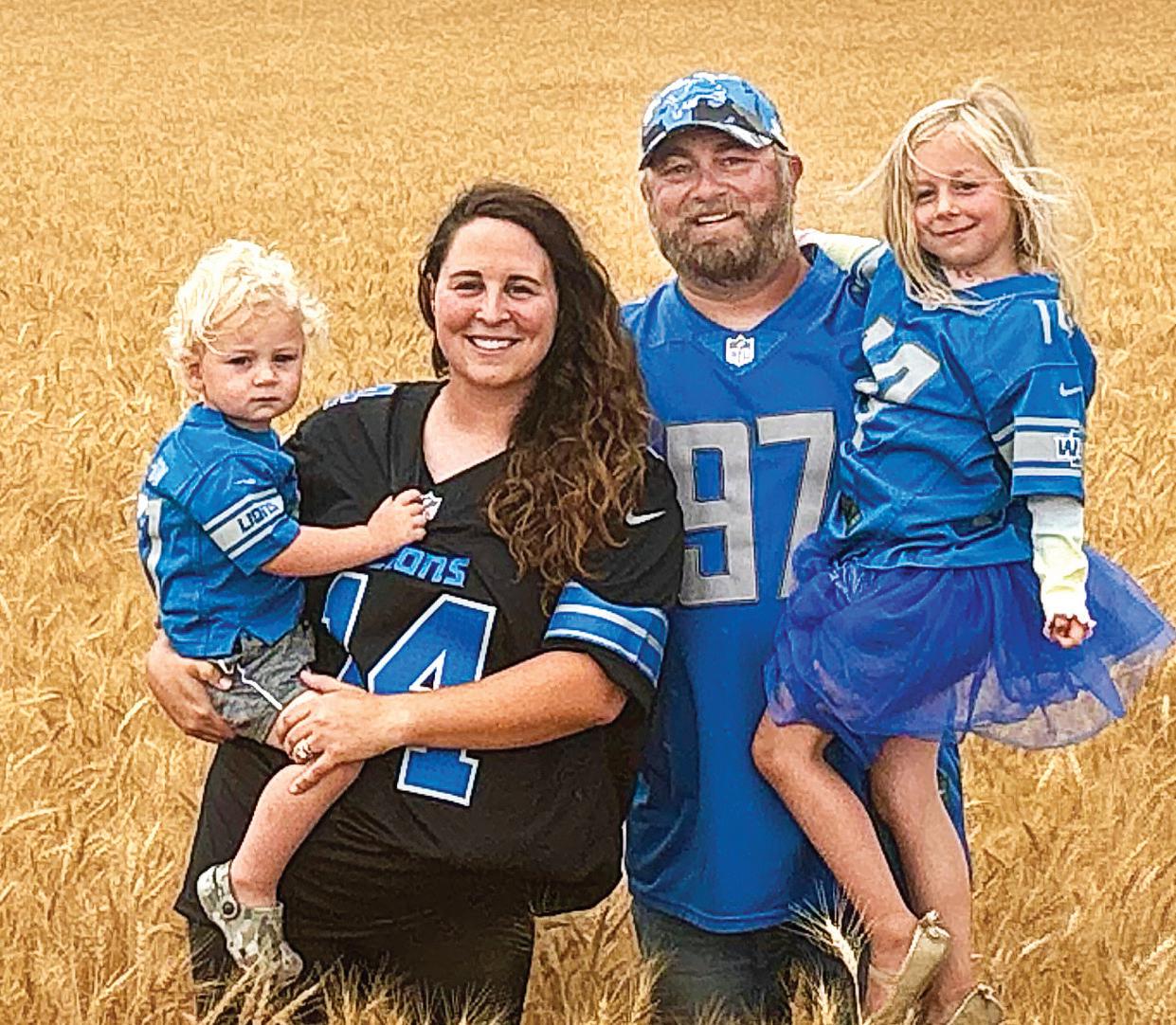
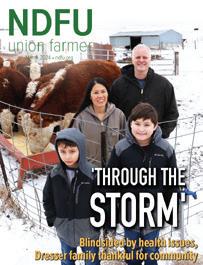





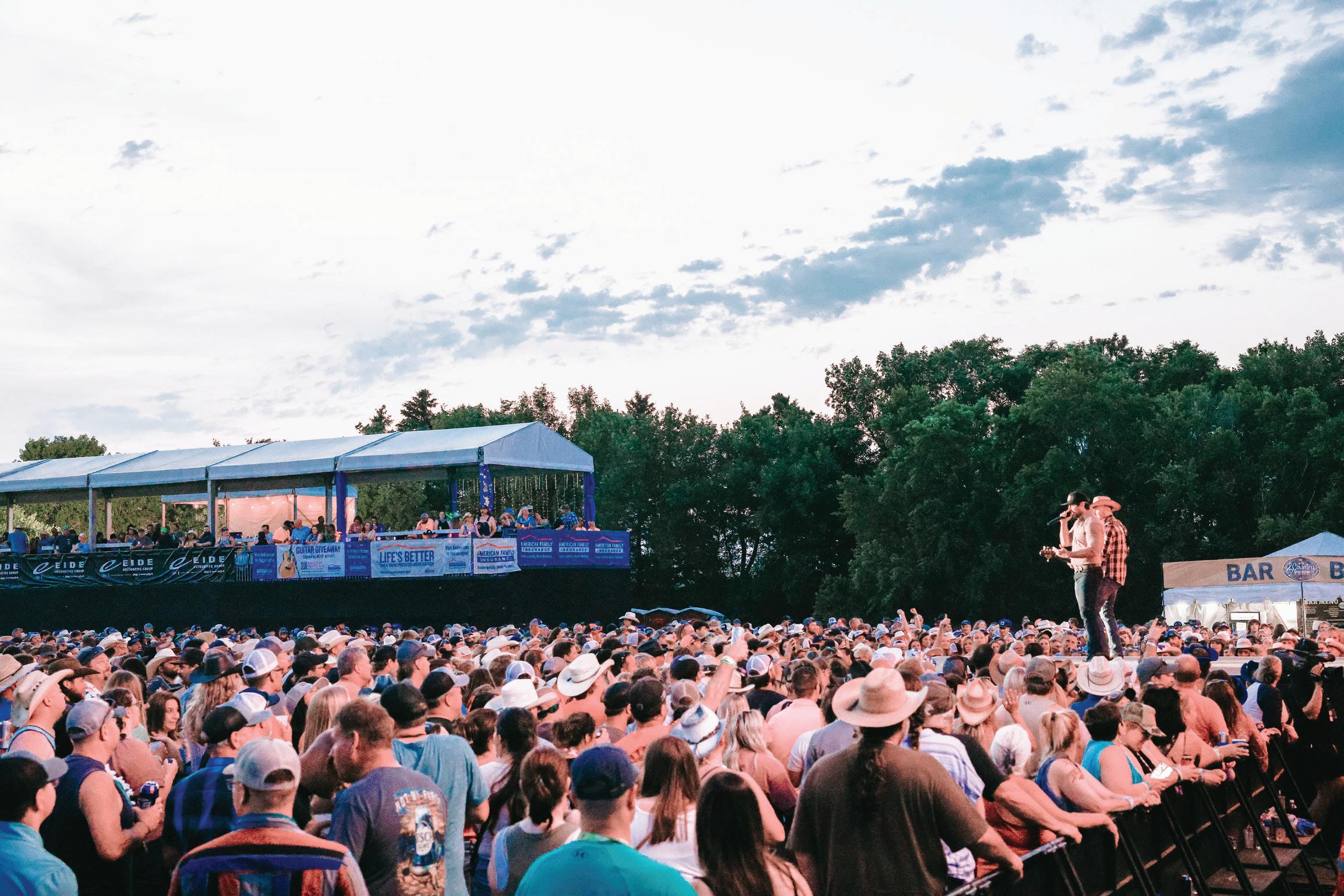



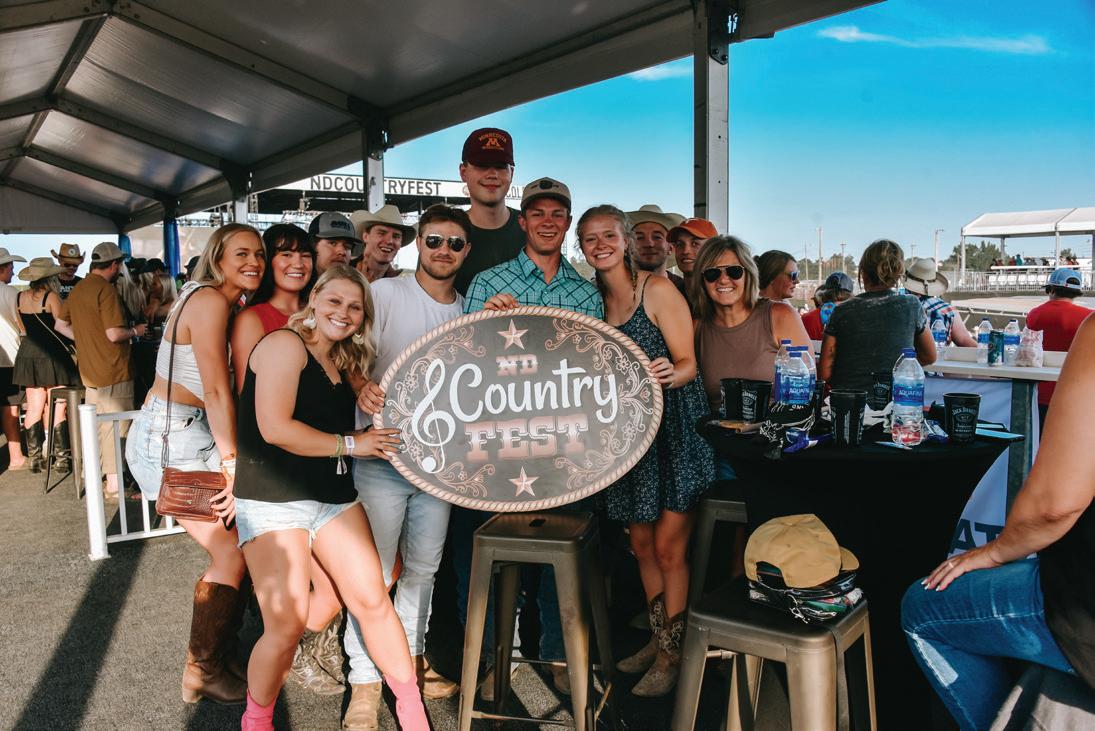

GRADES 3-6* (4 DAYS, 3 NIGHTS) – $135** GRADES 7-12* (5 DAYS, 4 NIGHTS) – $175**
*Grade youth will have completed by the end of the school year
**Early bird price. Price will increase $24 after May 15.
Heart Butte (near Elgin)
June 16-19
June 23-26
June 30 - July 3
July 15-18
July 22-25
James River (near Jamestown)
June 9-12
June 24-27
June 30 - July 3
July 14-17
July 21-24
Heart Butte (near Elgin)
June 10-14
July 8-12
July 29 - Aug. 2
James River (near Jamestown)
June 17-21
July 7-11
July 28 - Aug. 1
TRIPS (invitation only)
7TH & 8TH GRADE LOCK-IN April 26-27 in Jamestown
ALL-STATES LEADERSHIP CAMP May 29 - June 2 in Washington, D.C. (registration deadline May 1)

THIRD-YEAR AWARD TRIP
July 21-24, location TBD
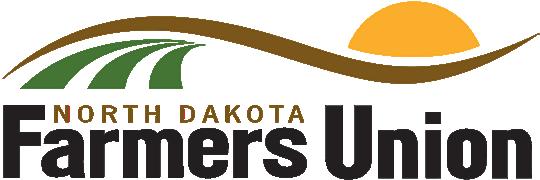
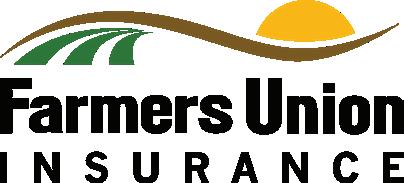


Senior camp theme nights!


Junior camp theme night!


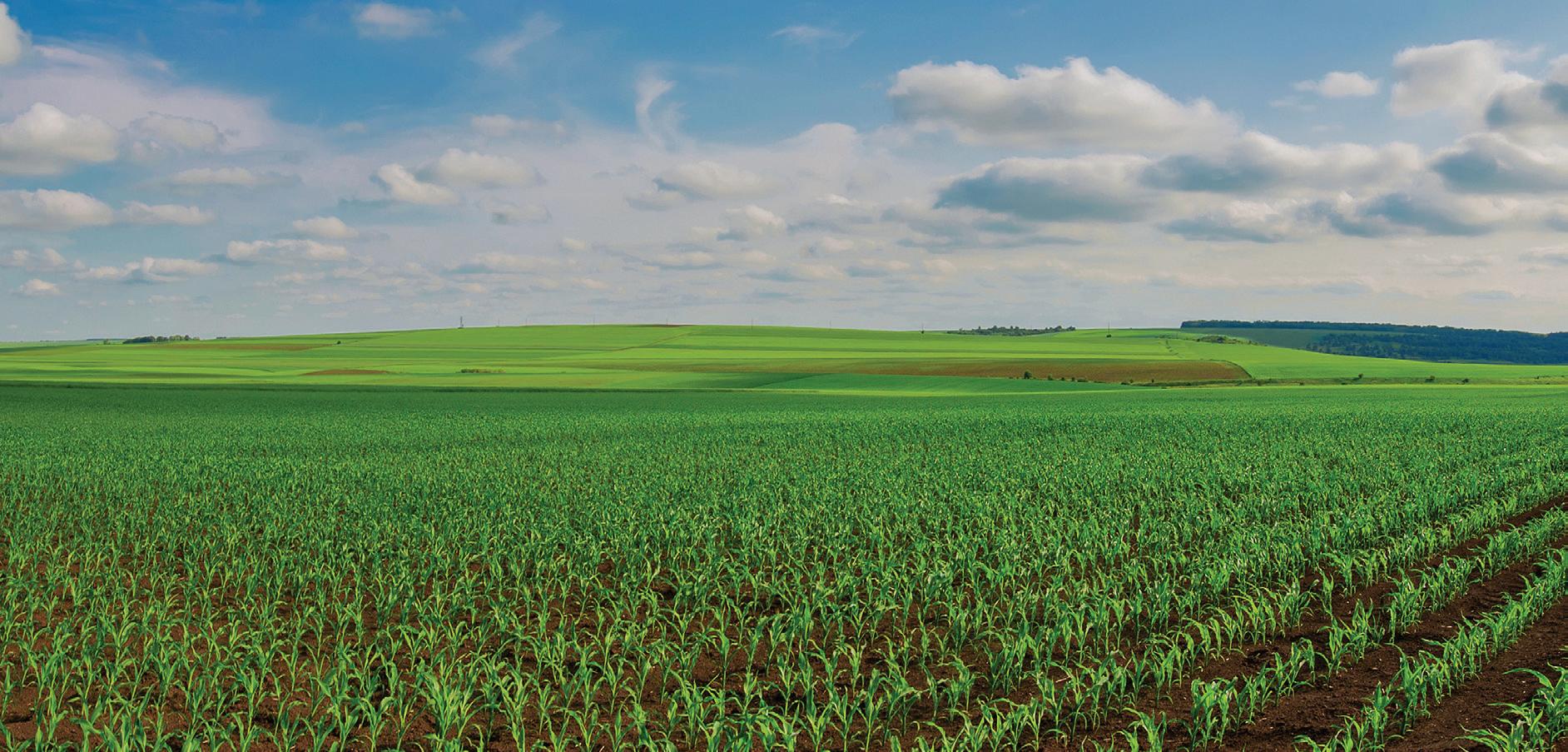
WASHINGTON, D.C. – The U.S. Department of Agriculture (USDA) is issuing up to $10 billion directly to agricultural producers through the Emergency Commodity Assistance Program (ECAP) for the 2024 crop year. Administered by USDA’s Farm Service Agency (FSA), ECAP will help agricultural producers mitigate the impacts of increased input costs and falling commodity prices.
Authorized by the American Relief Act, 2025, these economic relief payments are based on planted and prevented planted crop acres for eligible commodities for the 2024 crop year. To streamline and simplify the delivery of ECAP, FSA will begin sending pre-filled applications to producers who submitted acreage reports to FSA for 2024 eligible ECAP commodities soon after the signup period opens on March 19. Producers do not have to wait for their pre-filled ECAP application to apply. They can visit fsa.usda.gov/ecap to apply using a login. gov account or contact their local FSA office to request an application once the signup period opens.
Eligible producers must report 2024 crop year planted and prevented planted acres to FSA on an FSA-578, Report of Acreage form. Producers who have not previously reported 2024 crop year acreage or filed a notice of loss
for prevented planted crops must submit an acreage report by the Aug. 15, 2025, deadline. Eligible producers can visit fsa.usda.gov/ecap for eligibility and payment details.
Producers must submit ECAP applications to their local FSA county office by Aug. 15, 2025. Only one application is required for all ECAP eligible commodities nationwide. ECAP applications can be submitted to FSA inperson, electronically using Box and One-Span, by fax or by applying online at fsa.usda.gov/ ecap utilizing a secure login.gov account.
If not already on file for the 2024 crop year, producers must have the following forms on file with FSA:
• Form AD-2047, Customer Data Worksheet.
• Form CCC-901, Member Information for Legal Entities (if applicable).
• Form CCC-902, Farm Operating Plan for an individual or legal entity.
• Form CCC 943, 75 percent of Average Gross Income from Farming, Ranching, or Forestry Certification (if applicable).
• AD-1026, Highly Erodible Land Conservation (HELC) and Wetland Conservation (WC) Certification.
• SF-3881, Direct Deposit.
Except for the new CCC-943, most

producers, especially those who have previously participated in FSA programs, likely have these forms on file. However, those who are uncertain and want to confirm the status of their forms or need to submit the new Form943, can contact their local FSA county office. If a producer does not receive a prefilled ECAP application, and they planted or were prevented from planting ECAP eligible commodities in 2024, they should contact their local FSA office.
ECAP payments will be issued as applications are approved. Initial ECAP payments will be factored by 85% to ensure that total program payments do not exceed available funding. If additional funds remain, FSA may issue a second payment.
ECAP assistance will be calculated using a flat payment rate for the eligible commodity multiplied by the eligible reported acres. Payments are based on acreage and not production. For acres reported as prevented plant, ECAP assistance will be calculated at 50%.
For ECAP payment estimates, producers are encouraged to visit fsa.usda.gov/ecap to use the ECAP online calculator.
To learn more about FSA programs, producers can contact their local USDA Service Center. Producers can also prepare maps for acreage reporting as well as manage farm loans and view other farm records data and customer information by logging into their farmers.gov account. If you don’t have an account, sign up at USDA.gov.
Article courtesy USDA-FSA.

A tariff is a tax that is assigned to imports. Typically, we can expect it to make all imported goods more expensive. It also raises prices more generally in the economy, because the price of goods that compete with imports get higher as their competition’s price goes up.
Most economic work on tariffs by the United States concludes that the tariff burden falls on U.S. buyers of imports. Tariffs are, simply put, a consumption tax. They fall on those who are consuming either the imported goods or the goods that are competing with the imported goods.
Typically, a country has tariffs placed upon it in retaliation. Retaliatory tariffs are used to punish a country for what is perceived as an unfair or harmful trade practice, such as high tariffs on a country's exports or other trade restrictions.
North Dakota is hit hard by tariffs on exports with 82% of our exports going to Canada and Mexico. We are also hit hard by retaliatory tariffs as 62% of our imports come from these two countries. On March 4, Canada’s first wave of counter tariffs on U.S. imports took effect with more to follow, if we continue down the tariff path. U.S. Census Bureau data suggests North Dakota could be hardest hit among U.S. states, with over 80% of its exports destined for Canada.
Estimates indicate that tariffs of 25% on Canada, Mexico and 10% on China could have a cost increase for the American family of $2,000 a year. This does not include the retaliation actions by the countries that have tariffs imposed upon them, which further impact household costs.
There can be some income from tariffs, but the question of who pays for it is described above. Also, countries tend to import less when tariffs are in place so sales income is reduced. Tariffs can encourage local manufacturing but if the tariff is removed, the incentive for local manufacturing goes away, too.
Much of our imports are intermediate goods. Intermediate goods are unfinished goods
that become part of another final product that companies sell. An example would be steel and aluminum. When you tariff steel, that makes any goods that use steel more difficult to make and higher priced to produce in the United States.
North Dakota, as a high production state of food and energy and low population, relies on imports and exports as an economic driver. Tariffs hit us hard, and we lose. The initial impact is only part of the problem. We face long-term trading partner relationship strains that cause our trading partners to search for other markets and other suppliers. We get paid less over longer periods of time for the products we export.
The three countries we are currently in an early trade war with will have or will begin to






Article and photos by Pam Musland, NDFU Communications Director
In the height of the 1980s farm crisis, Sarah Vogel became a household name in North Dakota.
She was the soft-spoken attorney from Bismarck who took on USDA and won, righting injustices caused by the Farmers Home Administration when the agency began aggressively foreclosing on farm families without due process.
Her national class-action suit (Coleman v. Block) halted farm foreclosures, protecting the constitutional rights of 240,000 farm families. That case laid the foundation for federal legislation in 1987 that required fair appeals processes for most USDA programs.
Vogel went on to be elected North Dakota Commissioner of Agriculture in 1988, becoming the first woman in U.S. history to be elected to
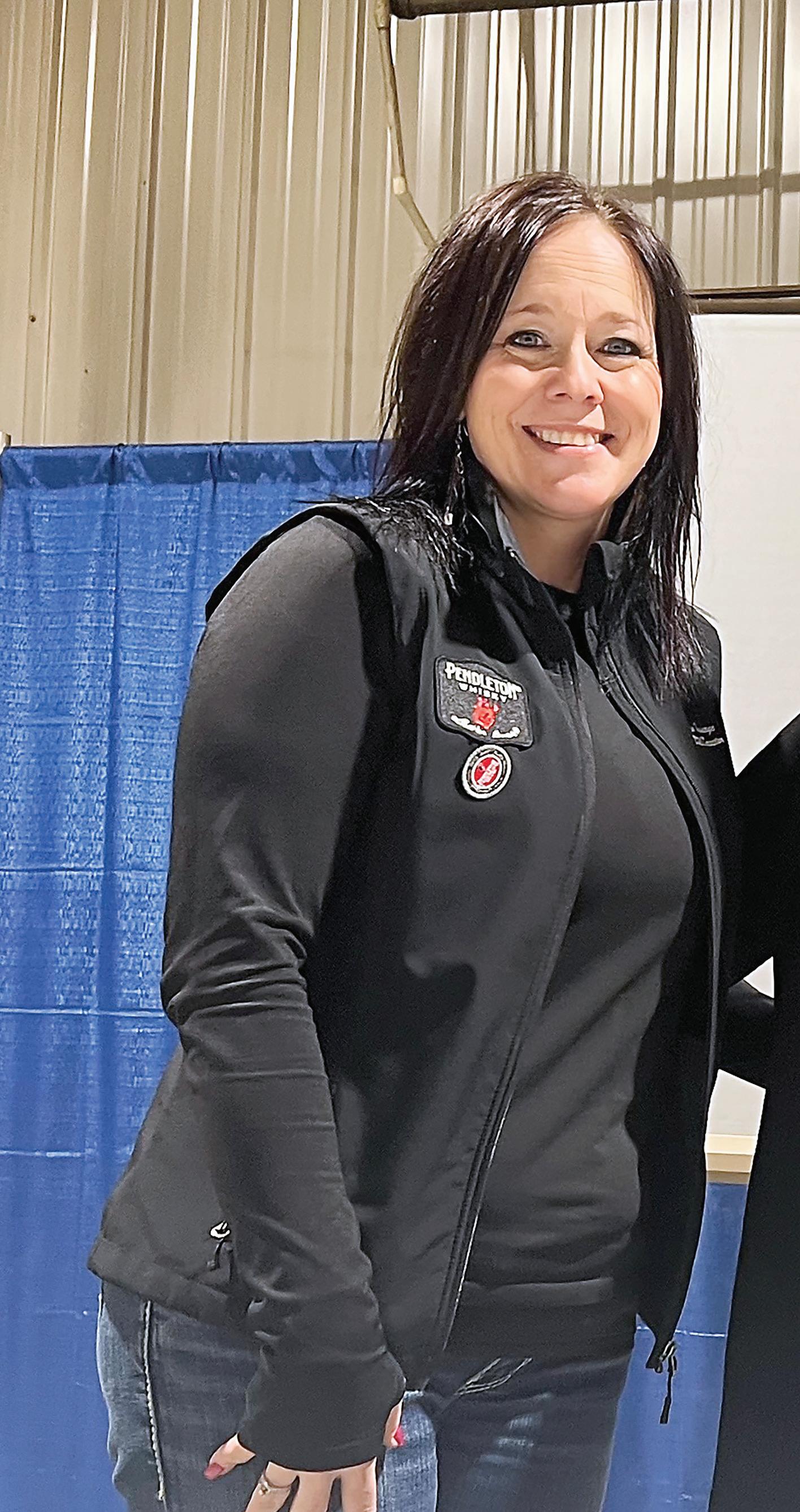
the position in any state. She served in that role from 1989-1997.
From 1999-2018, she was co-counsel on another national class-action lawsuit (known as the Keepseagle case), which eventually resulted in a $680 million settlement and required major reforms in USDA discriminatory treatment in lending to Native American farmers and ranchers.
Vogel continues her work to right injustices for farm families. She was inducted into the North Dakota Agriculture Hall of Fame on March 5, after NDFU nominated her for the prestigious honor.
Pam Musland, NDFU communications director, recently sat down with Vogel. As a legendary advocate for family farmers and ranchers, she remains humble to the core… ever Sarah.
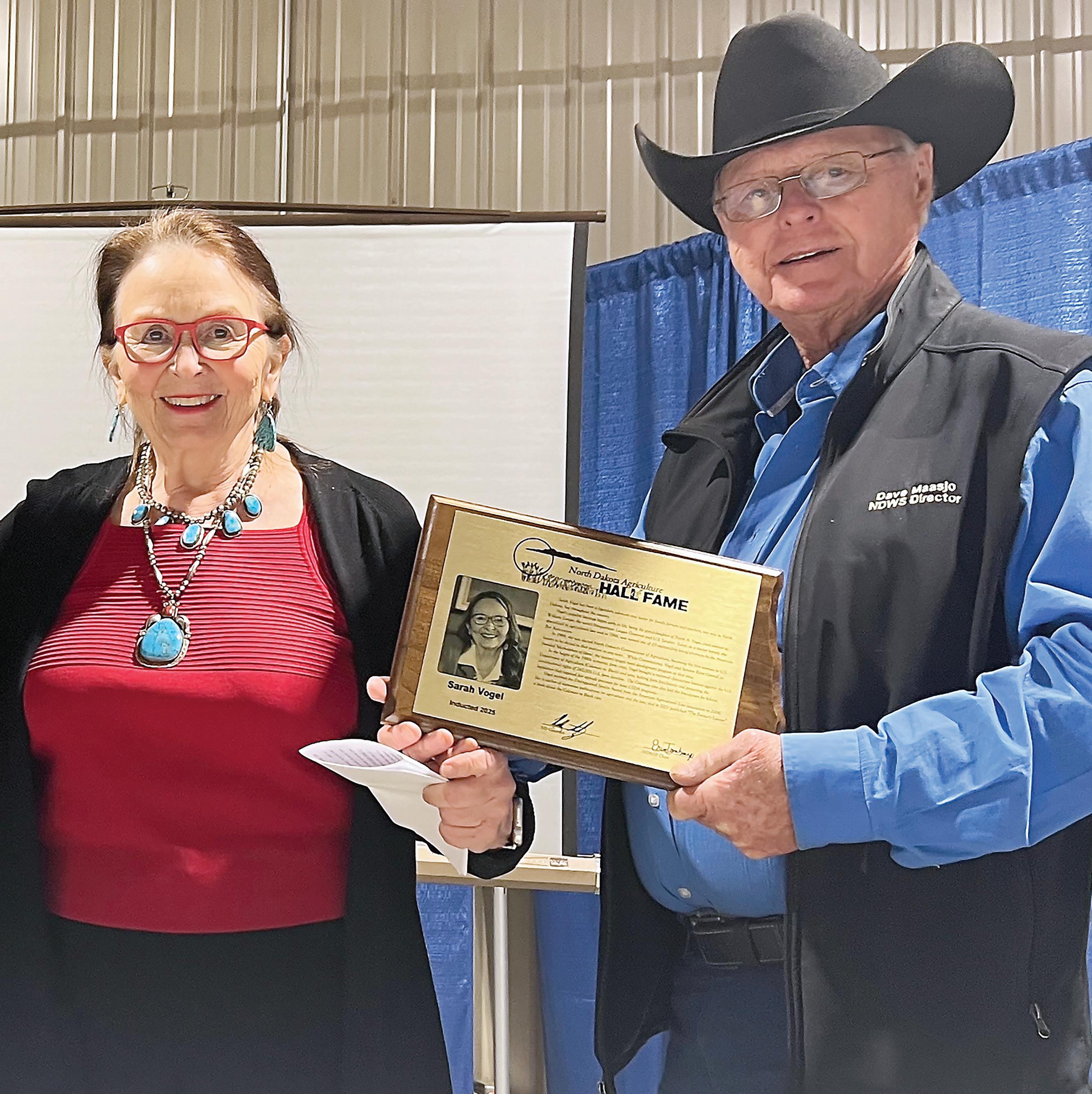
What does it mean to you to be inducted into the N.D. Ag Hall of Fame?
It's a delight. I'm not a farmer, but I've always worked for farmers. My dad and my grandfather were both advocates for family farm agriculture. When I was a little kid, I was taken to many, many, many Farmers Union picnics because my dad was the lawyer for the McLean County Farmers Union.
With the Coleman v. Block case, you made an impact on so many lives.
It was like the stars were shining on me. I was fortunate. My dad steered me to the right judge, Judge Bruce Van Sickle – a great man. [Vogel’s father, Robert Vogel, was a U.S. attorney and member of the N.D. Supreme Court.]
Most human beings would find it daunting taking on the federal government with all of its resources, but not Sarah Vogel of Bismarck, North Dakota?
I'd been part of the federal government Though. I knew the innerworkings a little bit. I’d been the head of the Equal Credit Opportunity enforcement program at the Federal Trade Commission. I'd been an aide to the Secretary of the Treasury.
I worked a little bit with the Department of Justice when I was at the Federal Trade Commission and I wasn't all that impressed by their lawyers. Also, I'd watched other lawyers take on USDA and had learned that they [DOJ] like to be the bullies … [taking on] little farmers and lawyers in small towns. I wanted to spring a trap on them. And then as I was working
CONTINUED ON PAGE 12
Sarah Vogel’s memoir “The Farmer’s Lawyer” was released in 2021.

CONTINUED FROM PAGE 11
on the case, I found famous lawyers to join me: Allan Kanner, the class-action expert, and Burt Neuborne of the ACLU, because it was a constitutional case. And I had my dad. At the very end of my book [The Farmer’s Lawyer], I say my dad was the real hero, in part because he paid my salary that whole year.
I think the Coleman case was the most significant case I ever did.
Do you think in the halls of USDA, you became a litmus test? Would Sarah Vogel come after us if we did this?
For a while, yes!
When I was Ag Commissioner, I had two young guys, Richard Quintus and Scott Carlson. They were the policy wonks and I made them read the Federal Register every day. And if they saw something that wasn't good for North Dakota farmers, they would write a comment and say this regulation should not be adopted or this should be changed.
And then later on, when I was no longer Agriculture Commissioner, I ran into someone from USDA. And they said, “We miss you. We used to count on you to catch corrections and to alert us if we were going down the wrong road.”
You mentioned not growing up on a farm. Was that a stumbling block as North Dakota agriculture commissioner?
When I started to think about running for agriculture commissioner, I was thinking about
it as a place where I could get things done that I wanted to do for farmers. I’d been in private practice and that's when I brought the Coleman versus Block case. And then I'd been an assistant attorney general for three years during the farm crisis.
One day, I went to the law, the Century Code, and I looked up the requirement for Commissioner of Agriculture and it said you had to be a North Dakota resident and 35 years old. So I met the qualifications. I saw there was no barrier. I didn't have to be a man. I didn't have to be a farmer.
You brought a whole different perspective and ability to that position.
Follow the law, folks, that was one. I’d also have to say that the Nonpartisan League heritage that I have was extremely important. And I had fabulous people working with me.
What are you most proud of during your tenure as ag commissioner?
Marketplace of Ideas and Marketplace for Kids. Marketplace of Ideas revived rural businesses. We didn’t want to have just another trade show where people were selling something. We needed to lift people out of commodity markets. It was people sharing hope … so optimistic.
I remember a young couple from the first Marketplace. They told me, “We felt hopeless. But now, we have so many ideas of new things we can do on our farm.” Marketplace gave hope in a very dark time and many new businesses started because of it.
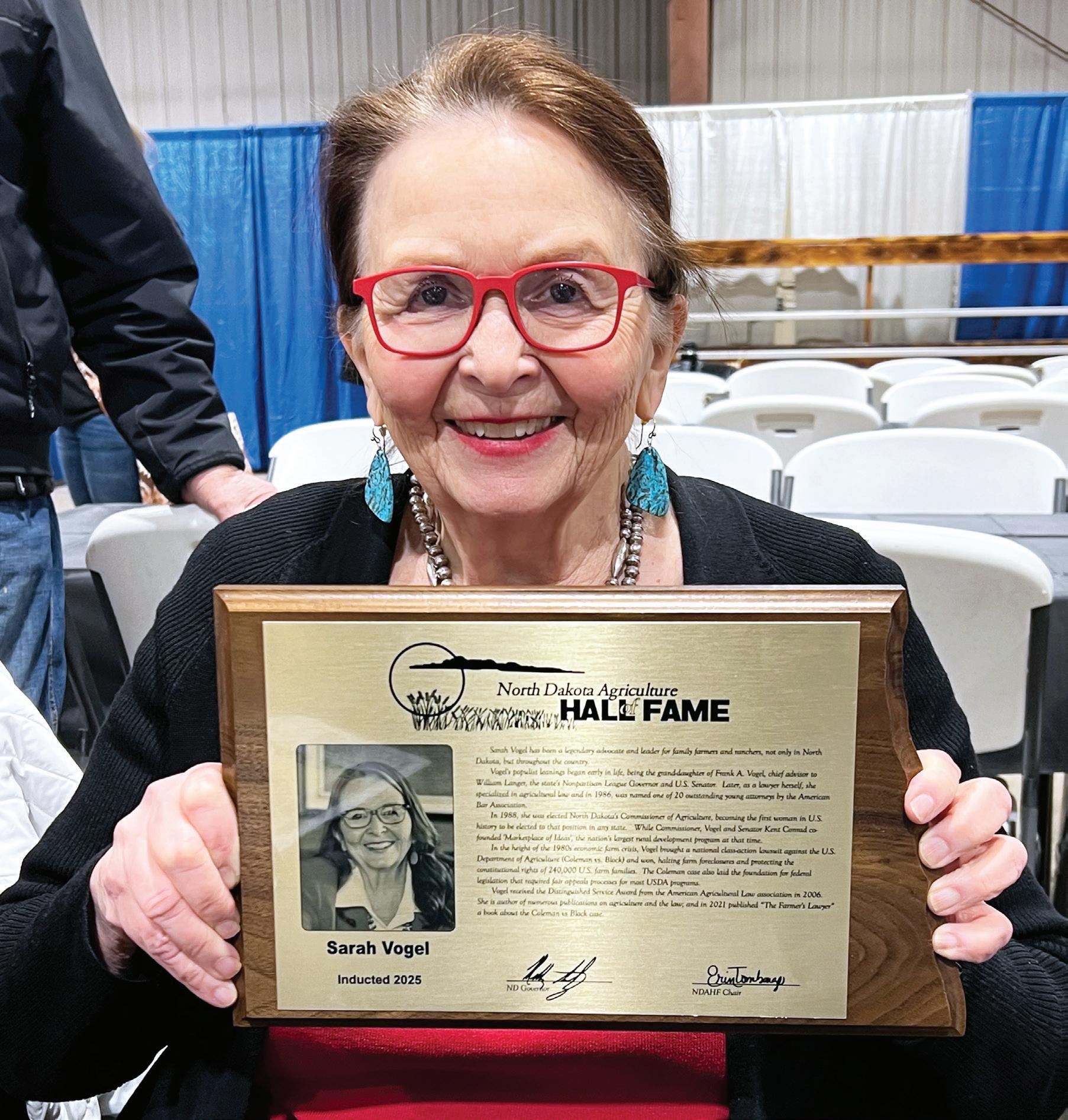
Why didn't you run for reelection to a third term?
In the Nonpartisan League, there's a policy that if a person ran for elected office more than two or three times they would be spoiled, they would be taken over by the lobbyists, the railroads, the grain elevators, and people like that. You would forget who you were working for. So, I did not run for a third term because it was programmed into my psyche. And I think there's truth to that policy.
Very few people know about Keepseagle v. Vilsack.
That’s going to be the topic of my next book. That’s what I’m working on now. Beyond the Keepseagle case, I did a lot of other work where farmers were being cheated. I love working with farmers because they work together so well. Because if a big corporation
came in and sold bad seeds then every farmer that bought that seed was affected.
For example, one day a farmer called and said, “I want to meet with you because I had some bad sunflower seeds.” And when he came to the office, he brought another farmer who also said, “I had this bad sunflower crop.” And then pretty soon, it was 15 farmers, and then I think it ended up as several hundred farmers. All of whom had bought the same bad seed.
The opportunities for class actions and group actions in agriculture is really strong. The companies that sell to and provide services for farmers count on any one farmer being unable to do anything. But when the farmers get together and work together, they can get a lot done, even against huge national and multinational companies and the federal government.
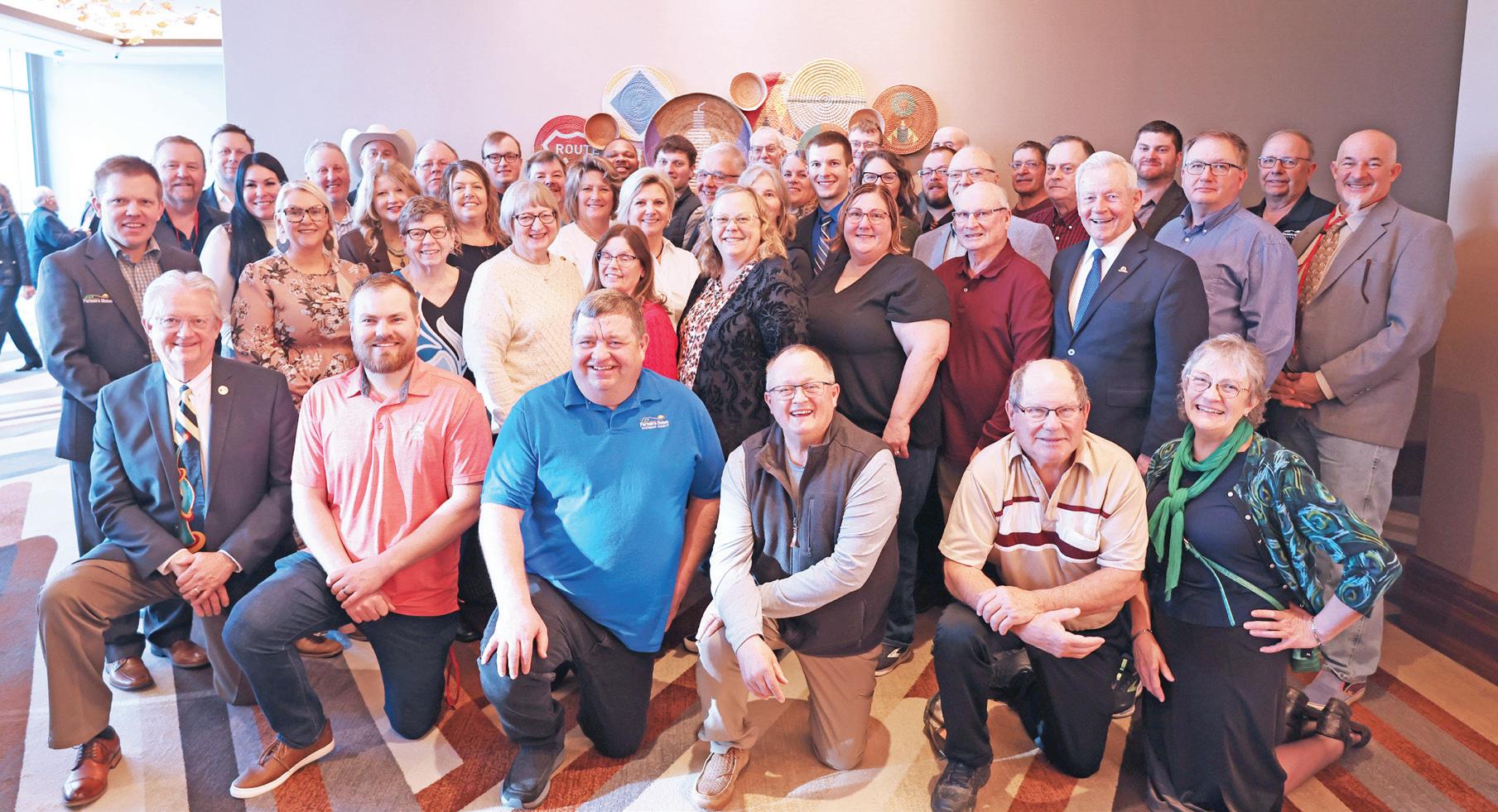
OKLAHOMA CITY — National Farmers Union (NFU) concluded the 123rd anniversary convention in Oklahoma City after the assembled delegates voted to finalize NFU’s 2025 policy priorities. NFU welcomed over 450 family farmers, ranchers and supporters to Oklahoma City for the three-day convention.
“This is a challenging moment for family farmers. Rising costs, corporate consolidation and uncertainty around federal programs — including the lack of a renewed farm bill — are creating real hardships,” said NFU President Rob Larew. “Yet through it all, the state of Farmers Union remains strong, resilient and prepared to turn the policies set at this convention into action for a stronger future in agriculture.”
The finalized policy priorities approved by NFU’s delegates include three special orders of business on timely topics: Fairness for Farmers, Family Farming and the Farm Bill, and Family Farming and Our Federal Government.
“NFU’s democratic, grassroots efforts that determine the organization’s policy priorities each year have unified family farmers and ranchers for 123 years,” said NFU Vice President Jeff Kippley. “We are leaving Oklahoma City feeling energized and ready to

tackle the challenges ahead.”
NFU hosted many prominent speakers to share their wealth of knowledge and expertise, including:
• U.S. Representative Angie Craig (Minn.).
• Jon Doggett, former CEO of the National Corn Growers Association.
• Vanessa Maria Graber, journalism and media education director, Free Press.
• R.J. Gray, president and CEO of Oklahoma Agriculture Cooperative Council, Inc.
• Chuck Hoskin, Jr., principal chief of the Cherokee Nation.
• Sarah Melotte, staff writer, the Daily Yonder
• Harrison Pittman, director, National Agriculture Law Center.
• Jim Schultz, CEO of Open Prairie.
NFU also announced a Farmers Union Week of Action to take place May 5-9. Farmers Union members will join together both in Washington, D.C., and in their communities across the nation to call on Congress to make farmers, ranchers and rural Americans a priority.
NFU will host America’s family farmers and ranchers again at the 124th anniversary convention in New Orleans, March 7-9, 2026.

Twenty-four North Dakota counties earned NFU's prestigious award for their work in increasing their membership the past year. The counties are Adams, Barnes, Benson, Bottineau, Burke, Burleigh, Dunn, Emmons, Grand Forks, Griggs, Hettinger, Kidder, Oliver, Pierce, Richland, Rolette, Sargent, Sioux, Stark, Stutsman, Walsh, Ward, Wells and Williams.
District 1 — Julie Gemmil, Fordville; Dee Decimus and Stephen Holmes, Grand Forks; John Kelly, Pekin; Christopher Lundeby, Osnabrock; Jeanna Smaaladen, Grand Forks.
District 2 — Mary Blumhagen, Bismarck; Maggie Iverson, Langdon; Philip Neubauer, Bottineau; Tyler Neubauer, Bottineau; Isaac Sherven, Ryder; Shane Sickler, Gladstone.
District 3 — Jarett Keith, Sherwood; Jerri and Steve Keith, Sherwood; Statler Olson, Mohall; Patty Jensen, Tioga; Tyler Stafslien, Ryder.
District 4 — Tim Fischer, Bowman; Aaron and Cindy Krauter, Regent; Sarah Kuylen, South Heart; Clifford and Elaine Meyer, Dickinson.
District 5 — Missy Axt, McClusky; Kevin Horneman, Bismarck; Bill and Karen Kershaw, Menoken; Miles Tomac, Mandan; Randy Ryberg, Menoken.
District 6 — Bob Buchholz, Lehr; Lynn Haro, LaMoure; Lacey and Clint Hetletved, Robinson; Mike Huebner, Jamestown; Wes Niederman, Elgin.
District 7 — Mark and Jean Bopp, Forman; Jim Dotzenrod, Wyndmere; Bernie Planteen, Cogswell; Dalton Wiest, Barney;
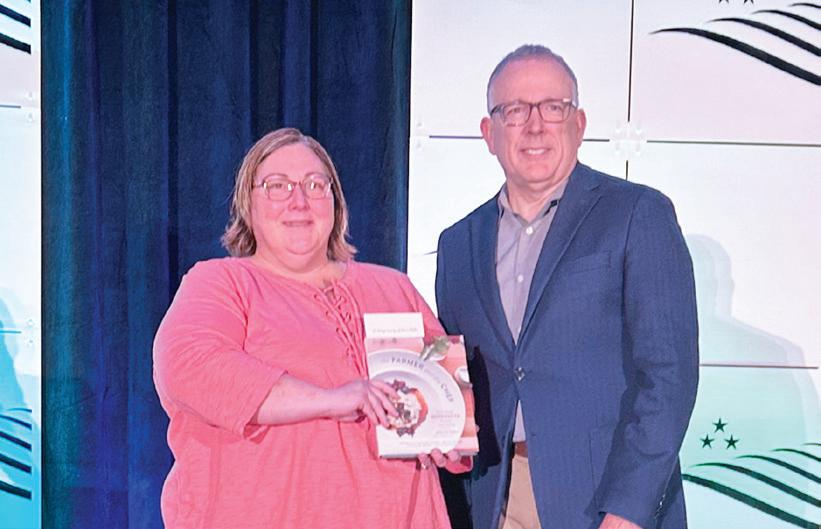

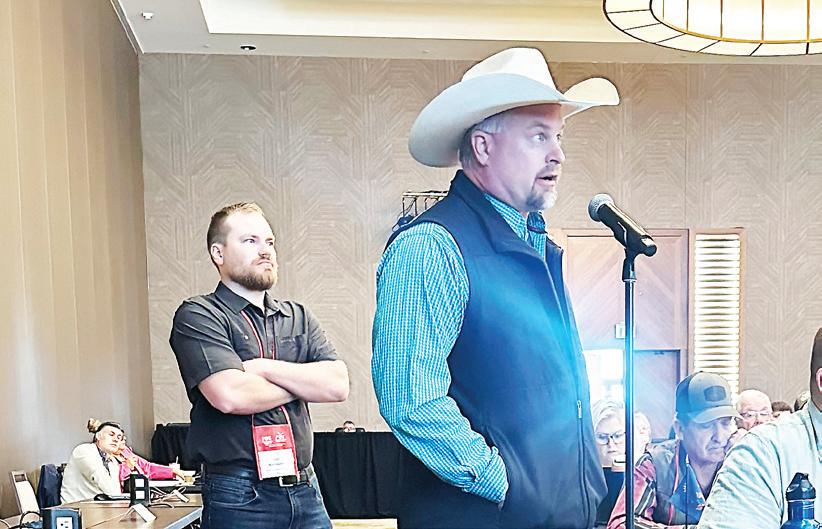
Clint Hetletved of Robinson talks during the policy debate, while Tyler Neubauer of Bottineau waits his turn.


Dalton Wiest of
served on NFU's national policy committee.
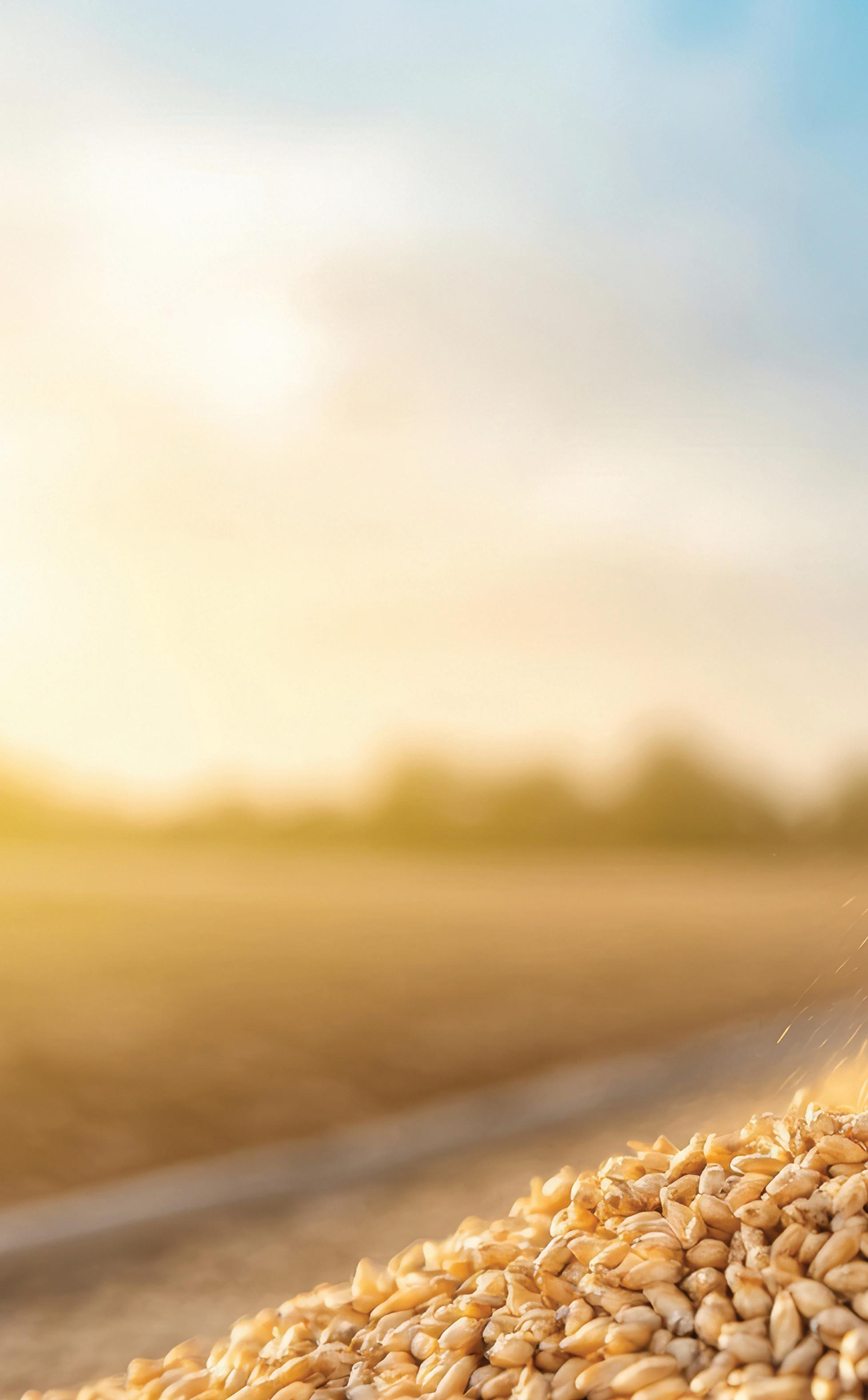
NDSU research shows agriculture remains a significant part of North Dakota economy, culture
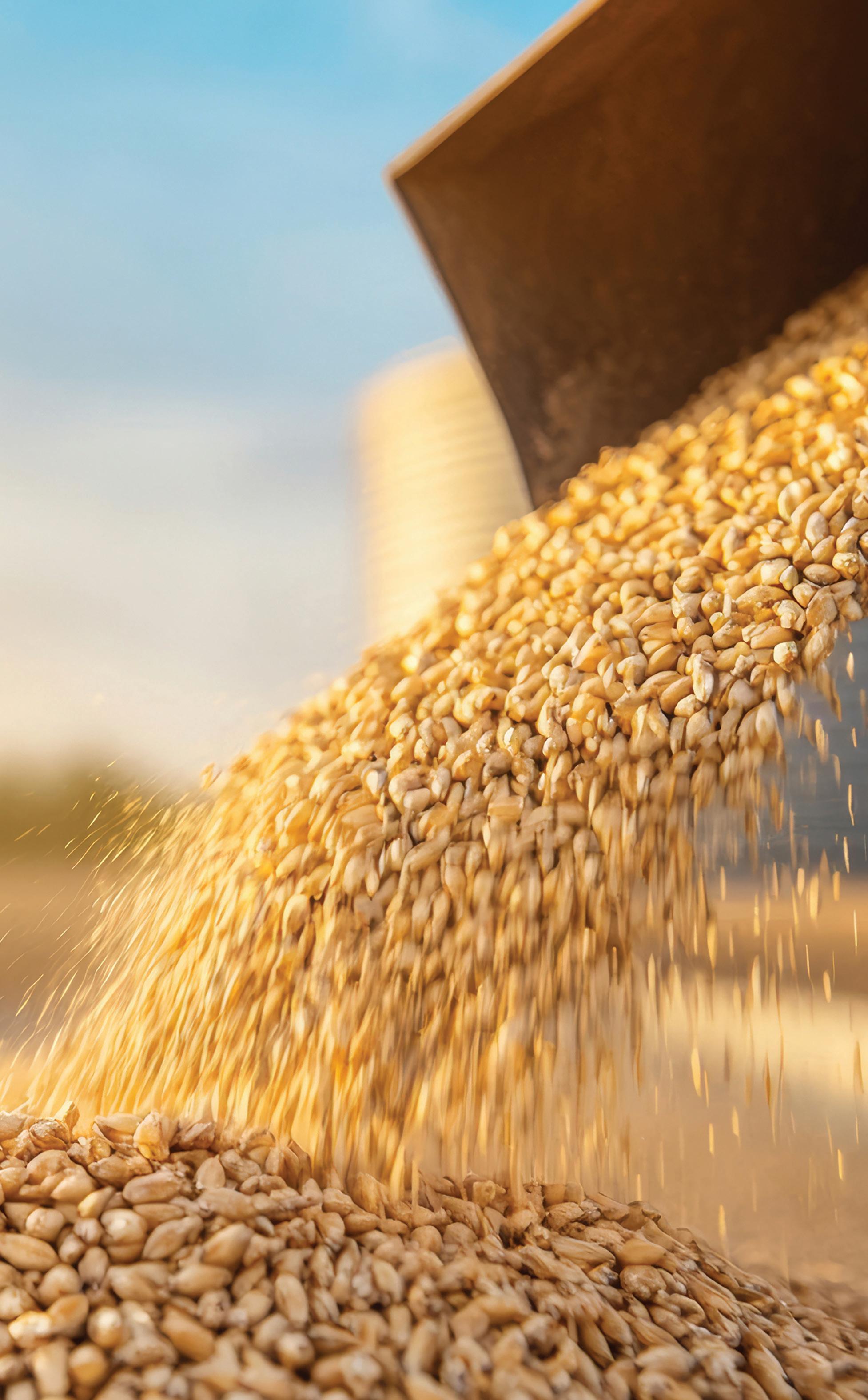
Story by Chris Aarhus,
Graphics and data courtesy of NDSU Department of Agribusinses and Applied Economics, and Center for Social Research.
Nearly 124,000 jobs that total 20.7 percent of all employment in the state. Over $41 billion in gross business volume. $896 million in local and state government revenues.
It’s safe to say North Dakota is dependent on agriculture, which continues to play a major role in the state’s economy, according to economic analysis released by NDSU research scientists Dean Bangsund and Nancy Hodur in January. The two are part of the Department of Agribusiness and Applied Economics and the Center for Social Research at NDSU.
The report was commissioned by numerous stakeholders within agriculture including North Dakota Farmers Union.
“Agriculture isn’t just an industry. It’s the
output of the industry was at nearly $26.0 billion. biggest segment of the was crop production, average annual direct $12.0 billion.
Commodity processing was with $8.6 billion in output, by farm input and manufacturing ($2.5 and livestock production billion)
economic effects similar pattern as output with the largest industry output by crop production, by
backbone of our economy and a cornerstone of rural prosperity,” said Dr. Greg Lardy, NDSU vice president for agricultural affairs in a press release. “This report reinforces the need for policies that drive investment and innovation in the sector.”
Bangsund said even as farmers and ranchers have become more efficient with significantly less manpower available than in generations past, agriculture continues to be a steady source of jobs.
AAE Report 828-S
CONTINUED ON PAGE 20
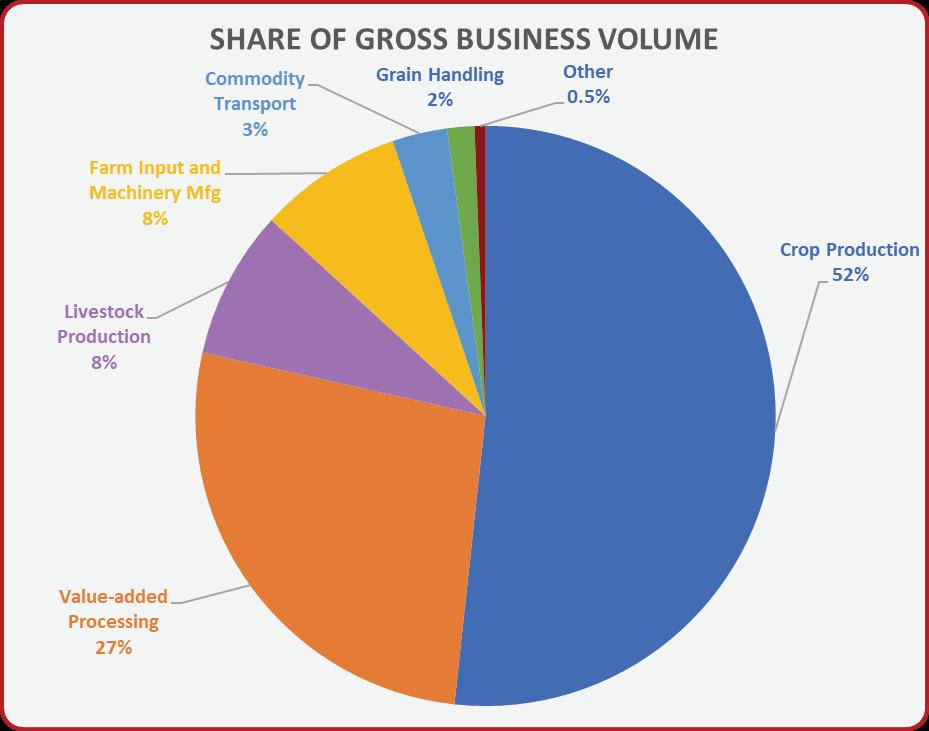

$41.3
billion gross business volume
$25.1
billion from production
$16.2
billion from commodity handling, transportation, processing, andmanufacturing
123,360 jobs (direct and secondary)
89,510 jobs supported by production
33,850 jobs supported by commodity handling, transportation, processing, and manufacturing
$10
billion in labor income
$18.2
billion contribution to state gross product
$896
million in local and state government revenues
25.5% of the state’s gross business volume
20.7% of all employment (wage/salary jobs and sole proprietors/self-employed)
7.5% of total state and local government revenues
CONTINUED FROM PAGE 18
“Farm production is becoming more capital with less labor,” he said. “But we’re also seeing that the (ag) supply chain is very labor-driven, so that’s a huge positive. It still employs a lot of people.”
With oil and gas activity dominating the state the past 15 years, Hodur said she hopes the results of the study will inform — and remind — citizens that agriculture is still a major player in the state.
“I’m always preaching that agriculture doesn’t just stop and start at the farm gate — it’s more than a combine or a horse trailer,” she said. “It’s one of the challenges the industry has, really communicating that message. We’ve got folks that moved to North Dakota the last 10 years, and they may not wander outside Fargo or Bismarck or Watford City, or they may see a lot of oil and gas. Agriculture is still ingrained as not only part of the economy but part of the
agriculture industry
averaged nearly 47,000 direct jobs over 2020 through 2022
Crop and livestock production the greatest direct employment with 22,840 and 8,810 jobs, respectively.
Commodity processing was estimated at 7,280 direct jobs, followed by agricultural manufacturing (2,690 direct jobs) commodity transportation 2,720 direct jobs)
culture of North Dakota.”
The two researchers did a study two years ago that was meant to give stakeholders a comprehensive look at where agriculture had been over the past decade. This time around, the study gave an update on crop and livestock production for data ranging from 2020 to 2023, with all other segments of the industry coming from 2023 data and being based on 2021 production.
Bangsund said value-added processing continues to be noticeable in the state. It is the second largest chunk of gross business volume at 27 percent, totaling $8.6 billion in output. He said the study tries to capture growth in not just new facilities, but with expansion.
“There’s internal growth within these plants, where they’re not adding new facilities, but they’re still adding capacity,” he said. “When you do a study like this, you want to make sure your bringing it all up to the same level, so then when we go forward, we can capture those
Report 828-S
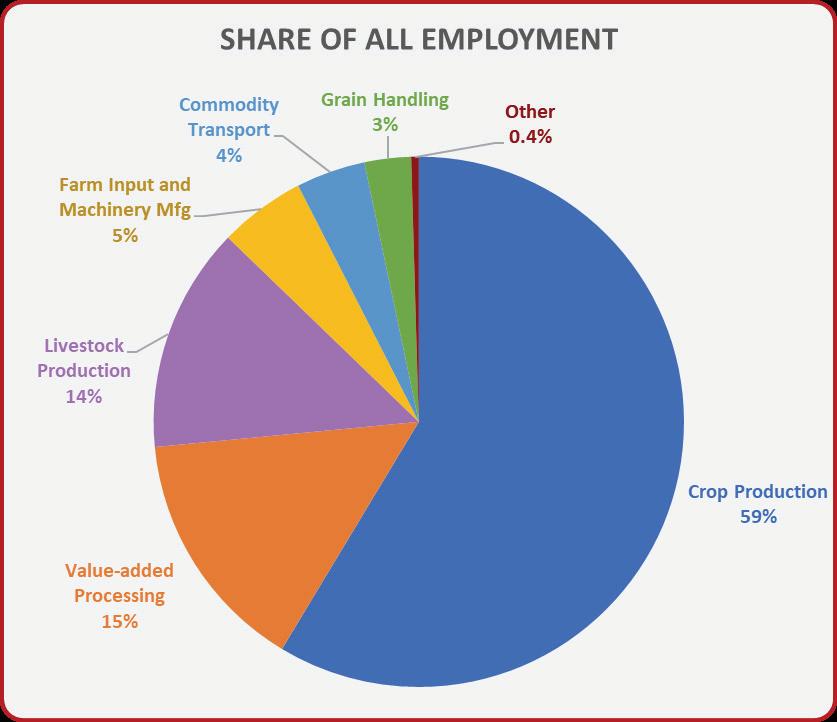
Combined secondary employment for all industry segments was estimated at 700 jobs. Crop and livestock production accounted for 57,600 the 76,700 secondary jobs. next largest segment of the industry was value-added processing with 11,000 secondary jobs. Combined direct and secondary employment for
adjustments if they happen again.”
Crop production accounted for 59% of all ag employment at 72,320 direct and indirect jobs, with commodity processing accounting for more than 18,000 and livestock production just under 17,000. Crop production is defined in the study as, “sales, income and expenditures for growing grains, oilseeds and other crops. Businesses that supply inputs and services to crop production represent indirect effects for this segment of the industry.”
Government revenues for agriculture were $896 million, with 45% of that money going directly to property tax.
Bangsund and Hodor said the study reflects a period in agriculture when prices were better than they are now. Nonetheless, it provides producers and industry a chance to come together and promote agriculture.
“The real value here is that all of (agriculture) can have the same message,” Hodur said. “Growing corn is important, and it helps make
agriculture industry’s contribution to gross state product (GSP) is represented by estimates of value added supplemental appendix discusses value-added measures). Direct economic output for crop and livestock production contributed $6.2 billion to the state’s GSP, followed by commodity processing ($2.1 billion), and input and machinery manufacturing ($1.0 billion). contributions to GSP were than $0.5 billion for all other industry segments. Average annual direct value-added summed for all segments contributed $10.2 billion to GSP.
ethanol. Sugarbeet producers … livestock producers … they’re all important. They’re important as commodities (and groups), but they’re integrated and interrelated. This study lets them tell their individual stories but also tells the story of the whole.”
Bangsund and Hodur’s general summary of the study can be found at Extension’s website at https://ndfu.org/agstudy/. They will continue to release more detailed information from their study in the near future.
Stakeholders who helped fund the study: NDFU, North Dakota Agricultural Association, North Dakota Corn Growers Association, North Dakota Dry Bean Council, North Dakota Farm Bureau, North Dakota Soybean Council, North Dakota Soybean Growers Association, North Dakota Stockmen’s Association, Northern Canola Growers Association, Northern Pulse Growers Association, Northland Potato Growers Association, and Red River Valley Sugarbeet Growers Association.
AAE Report 828-S

the fourth children’s book from North Dakota Farmers Union
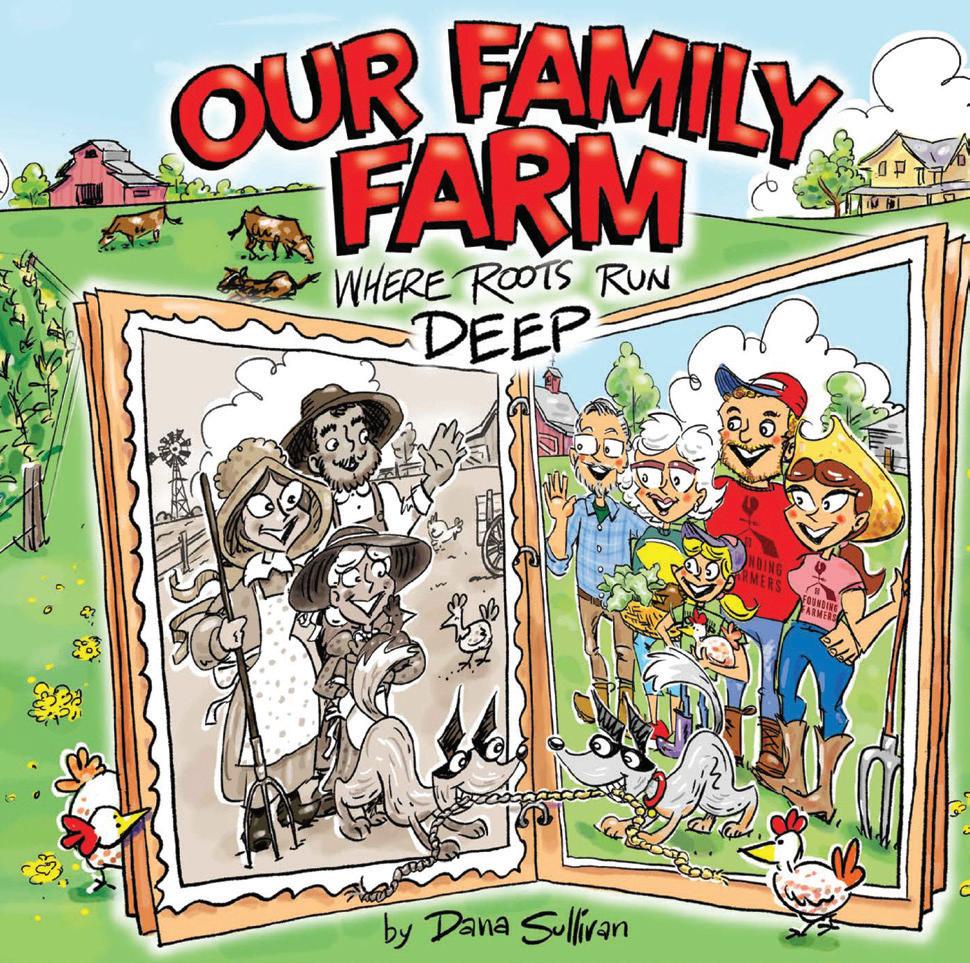
$16.95 plus tax

Dusty learns about generations of family and equipment on their farm, and the latest in soil technology. Find out how Dusty makes Gramps a new thingamajig for his tractor to save the day!


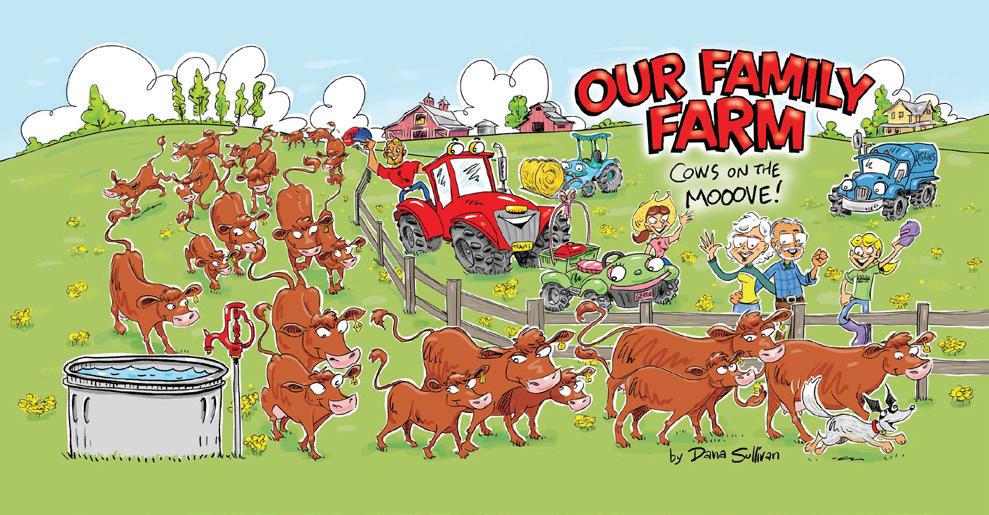


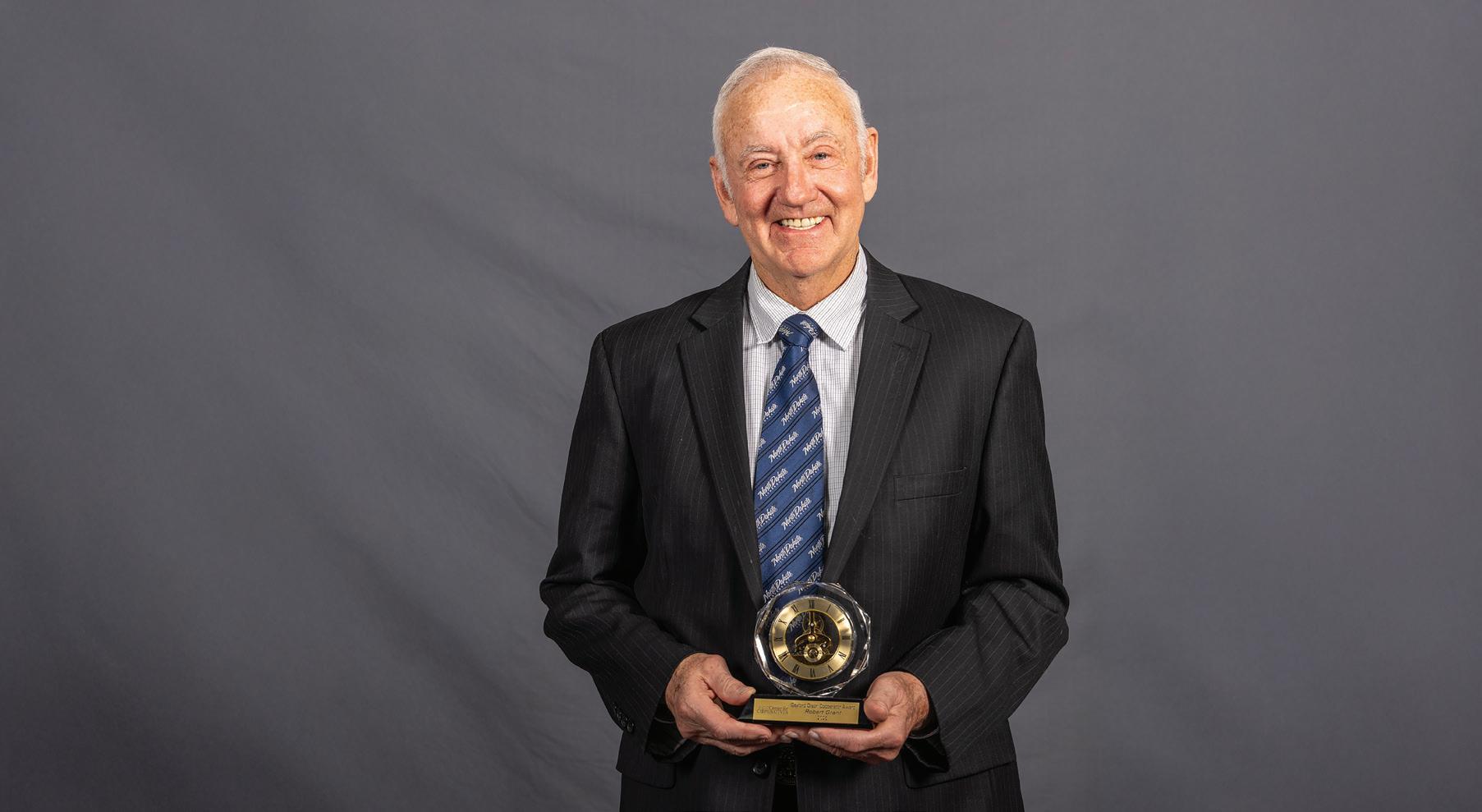
The Quentin Burdick Center for Cooperatives honored Robert Grant with the Gaylord Olson Cooperator Award on Feb. 11. The award, which honors North Dakota’s unsung cooperative heroes, was presented during an awards ceremony held in conjunction with NDAREC’s 82nd annual meeting.
For more than 40 years, Grant has served North Dakota’s electric cooperatives with courage, integrity and a commitment to cooperative values.
“Cooperatives are often viewed as highmaintenance businesses because it takes a lot of time and effort to keep them running smoothly and serve their members' diverse needs,” said QBCC Director Frayne Olson. “There are people within every cooperative who put extra effort into making the co-op strong and successful. These people are rarely recognized for this extra work. I am very happy and humbled that the Gaylord Olson Cooperator Award was created so these people can be acknowledged for their commitment.”
First elected to the Mountrail Electric Cooperative board of directors in 1981, Grant helped guide the electric distribution cooperative through a merger with neighboring Williams Electric Cooperative, forming Mountrail-Williams Electric Cooperative in 1991.
Over the next 30 years, Grant helped evolve MWEC. His leadership in the boardroom ensured his rural electric cooperative could successfully build out its system to meet the burgeoning power needs of the oil and gas industry in the Bakken region.
As president of NDAREC, Grant made many consequential decisions. Understanding the importance of a well-trained workforce, he led the association through a major headquarters renovation and construction of an all-seasons Lineworker Training Center. These state-ofthe-art facilities provide opportunities to train current and future cooperative employees.
Under Grant's leadership, NDAREC also formed the North Dakota Rural Electric Cooperatives Foundation. This public charity provides resources to empower rural communities to address challenges and improve quality of life.
Awarded since 2022, the Gaylord Olson Cooperator Award is the highest honor bestowed on those who have made significant contributions to North Dakota’s cooperatives. Past honorees include David Cobia and Frayne Olson.
Article courtesy of NDSU Ag Communications


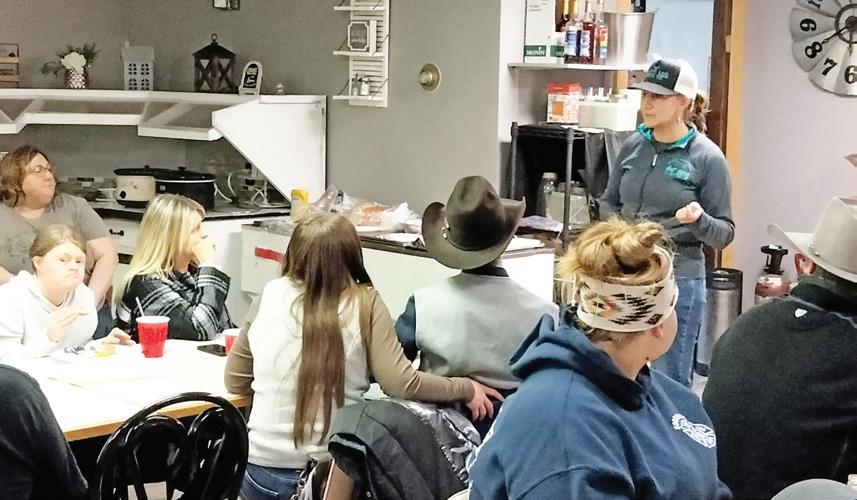


Morton County Farmers Union held its game night in February, inviting counties from District 5 to take part in the fun, which included a cornhole tournament.
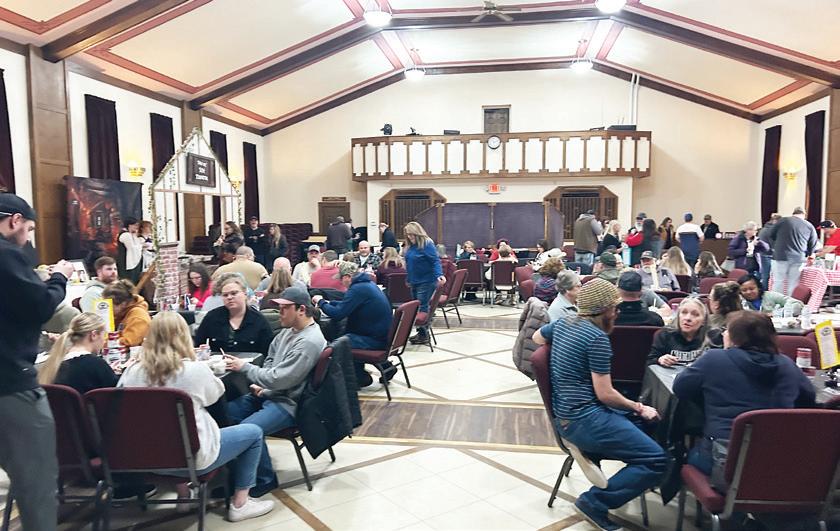


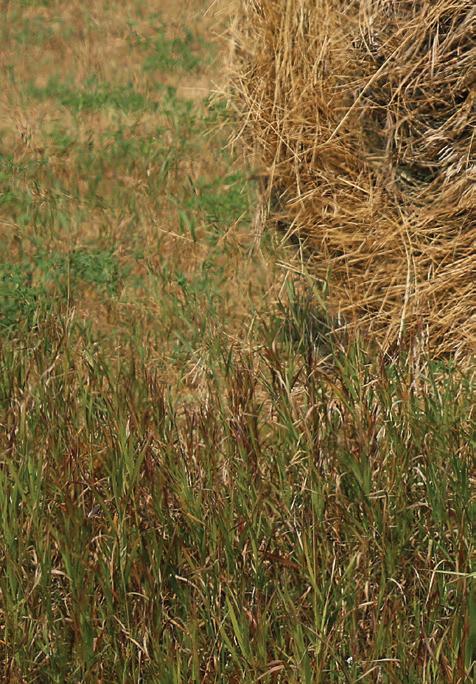
March 31 — Cavalier County shop talk, 5 p.m. at the Osnabrock Fire Hall.
April 1 — Barnes County meeting, 8:30 a.m. (Breakfast at Sanborn).
April 4 — Ransom County at Harvest ND, Lisbon.
April 4 — Burleigh County Farmers Union family event at Bobcats hockey game • Free to NDFU members (limited) • Email Michaela at micweigel@gmail.com.
April 8-10 — NDFU Board of Directors, Jamestown.
April 11 — EPIC training at Jamestown.
April 26 — Rolette County picnic, 5 p.m.
April 26-27 — NDFU 7th-8th grade lock-in in Jamestown.
May 5-9 — NFU Fly-in, Washington, D.C. • Contact Matt or Jessica at the state office if interested.
May 29-June 2 — All-States Summit.

June 5 — Free day at camp (James River and Heart Butte).
June 10-12 — Farmers Union Insurance Sales Conference, Bismarck.
July 8-11 — NDFU Board of Directors and Board of Governors, Jamestown.
July 13 — Stark County picnic, noon.
July 21-24 — Farmers Union Enterprises Leadership in Wisconsin.
July 25-27 — Grow to Lead Session 3.
Sept. 7-10 — National Farmers Union Fly-in, Washington, D.C.
Nov. 8-10 — NFU Women's Conference.
Nov. 11-13 — NDFU Board of Directors, Jamestown.
Dec. 4-5 — CHS Annual Meeting, Minneapolis.
Dec. 12-13 — NDFU state convention, Bismarck.

MAIL DONATIONS TO: NDFU Foundation P.O. Box 2136 Jamestown ND 58402
Please note if the gift is in honor of someone. For more information, contact Lucy Bardell at 701-952-0114 or lbardell@ndfu.org. Donations of more than $1,000 are recognized at the state office on the NDFU Donor Recognition Wall. Giving levels include:
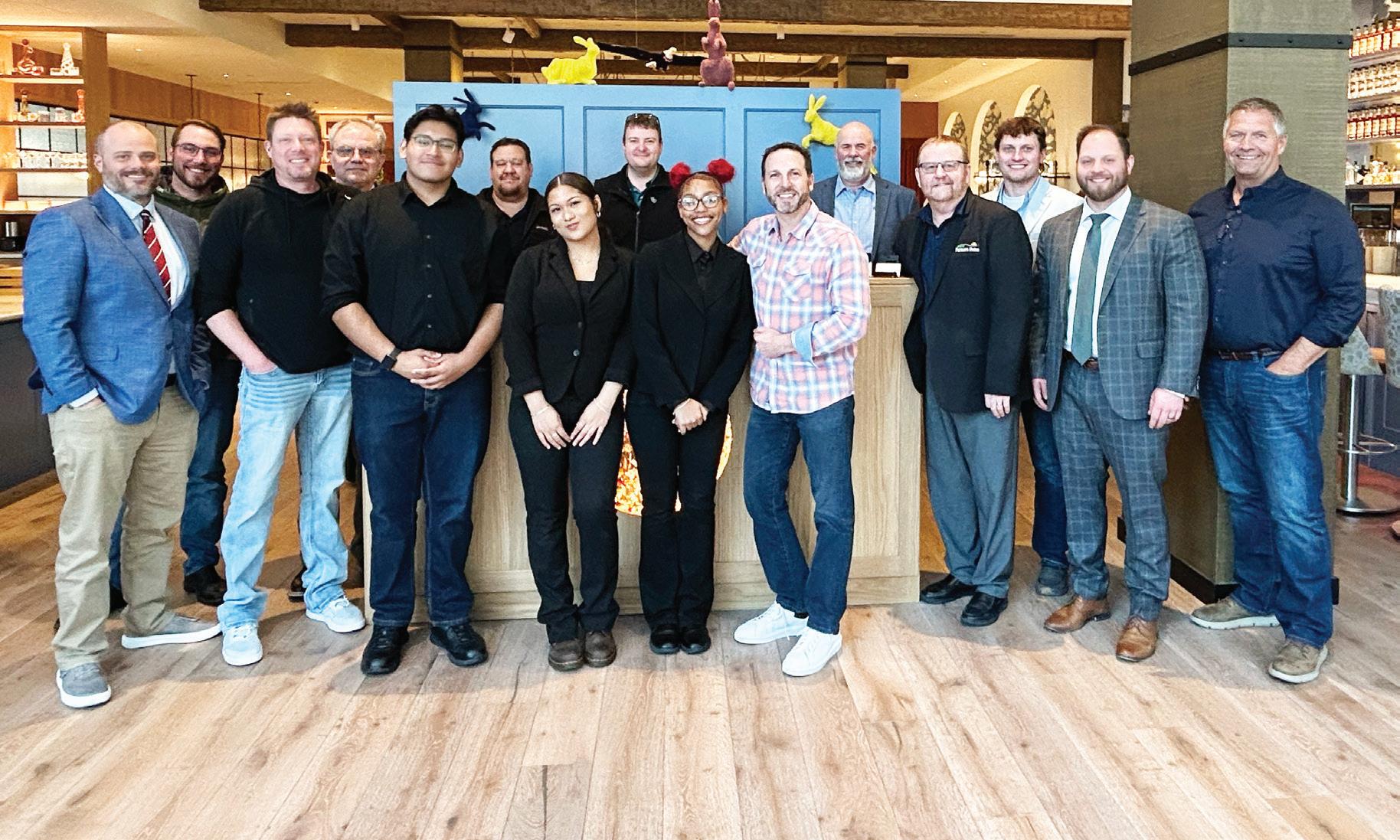
In the week leading up to Founding Farmers Alexandria opening its doors to the public, a group of NDFU board members and farmers got to experience Founding Farmers Restaurant Group’s newest and eighth restaurant in Alexandria, Va.
As part of the pre-opening practice, the restaurant was open for simulated service for team members, suppliers, vendors, and other close friends of the company, including some of the farmer-owners themselves!
The farmers got a special, behind-the-scenes tour of the entire restaurant, from the intricate blown glass art piece behind the bar to the full-service all-day Bakery & Cafe. The afternoon at the restaurant ended with an impeccable meal full of brand-new menu items including slow roasted, juicy rotisserie chicken and innovative “Farmhouse” sushi.
Founding Farmers Alexandria opened its doors on March 12 and is off to a great start. The
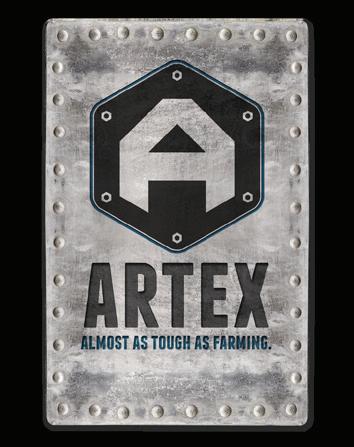

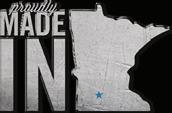



“With the help of the Stanley Moore Scholarship, I can ensure that I have the financial ability to continue to further my education and return back to my family farm versed in new practices and skills.”
Connor Johnson
Recipient of the 2024 Stanley Moore Scholarship
Ads must be submitted through the online form at www.ndfu.org. Click “Classifieds” at the very bottom of ndfu.org and fill out the online form. Ads must be re-submitted each month. No exceptions! Deadline is the 15th of every month. Limit 75 words.
MEMBERSHIP DUES MUST BE CURRENT!
PLOW, 770 5-16 IH plow; 6601 JD pull type combine; 4400 JD combine for parts, many good parts, take all or just what you need; 7200 IH hoe drill, two 14 ft drills parts only; 852 New Holland round baler in good condition; 851 NH baler to use or for parts; 3 Chevy 350 motors, all are rebuildable, complete; IH 263 inline 6 motor out of a 403, good run motor. 701-2696216, Jerry Miller, Streeter.
COMBINE, 2001 JD 9750 Combine, PRWD, Cont Master - Eng -4968/Sep- 3331. Above avg condition; 2010 635F Flex Head w/ Crary Air Bar; Starfire 3000 Globe, New Shroud, Good Shape; JD 2014 DB60 PARTS: 36 JD Pro-Series XP Meters with Mini Hoppers/Trimble True Count Air Clutches/Seed Tub Sensor Wire Harnesses 3 control boxes/Air tanks to run clutches for 3 row shutoff; Trimble Wiring/ Hoses. 36+ Steel Closing Wheels & Dry Rate Controller. 701-321-5711, John Kempf, Ashley.
RIM, 12x36 International, new. $400. 701-4352676, Edward Kuhlmann, Wimbledon.
GRAIN HOPPERS, two triangular grain hoppers w/straps/chains to fasten onto grain auger; old front tine rototiller; transition for adding aeration to an existing grain bin/screens/fans; 32 gallon outdoor rubber garbage cans. 701629-9003, Doug Halden, Stanley.
JD 8410 TRACTOR MFWD, 230 HP, 7900 hrs. front weights, quick tach hitch, PTO, 3 hyd. ports, Firestone 20.8R42(520/85R42) rear duals, 50%,Titan 420/90R30 FWA singles 80%, Asking $65,000; JD 8200 tractor MFWD, 180 HP, 11K hours, 3 pt. PTO, 14.9 R X 46 duals 50%, 14.9 R X 30 front singles 25%, asking $45,000. Pictures available for both. 701-852-8973, Glen Nagel, Jamestown.
FNH TRACTOR, 1995 Ford New Holland 9480 Tractor; 20x8x42 Tires (75%); 7,400 Hours; 855 Cummins Engine; Clean Tractor; $38,000. 701520-1251, Lee Menzies, Cavalier.
TRACTOR, 15-30 McCormick Tractor make offer, 1 new tire LT245-75R-Load Range E. Two cream separators, 4-wheel Steel Running Gear, 1 Covered Wagon Running Gear. 12’ Kirschman Drill, 4 Btm Pony and Packer. Email larryn@ westriv.com. 701-548-8020, Larry Nagel, Shields.
TARP, Shur-Lok Roll Up Tarp for 18’ box. Bought truck and don’t need this. Can send pictures. $200, 701-872-6117, Troy Tescher, Beach.
CHISEL PLOW, JD 100 chisel plow $600; IH press drills reconditioned, different sizes; Used parts for IH press drills and Laymen chain stack mover, $1800; Super A IH tractor, good paint, runs good, $2800 and have Krause disk. 701400-5742, Gerald Miller, Mandan.
JD 8970, shows 9,325 hrs., 4WD, CAH, 24 spd., 44 gpm hyd. pump, 4 hyd., decelerator pedal, radar, John Deere ATU 200 steering wheel, rear wheel weights, 710/70R38 duels, engine rebuilt at approx.8705 hrs. John Deere air seeder plug in, Murphy switch. John Deere 893 corn head, calmer knife rolls and slow down sprockets; John Deere 640fd head flex draper head, 40', dual sickle drive, AHH, single pt. hookup, hyd. fore/aft, stubble lights. 701-3201580, David Mutschler, Wimbledon.
MOWER, Kosch double 7 pitment mower. 701537-3927, James Evenson, Towner.
TRACTORS, IH 706, 806, 1206, 856, 1256, 1456, 966, 1066,1466,1566, others; JDs 4520, 4620, 5010, 5020, 6030, others; MM 950 on up; Oliver 1964 on up; ACs 200, 210, 220, D-21; will buy all running or not. 701-6282130, Jerry Lumley, Stanley.
IH PRESS DRILLS, any size; Tillage disks. 701400-5742, Gerald Miller, Mandan.
GOLF CART, 2023 Clubcar, 20-plus hours, gas motor, extended warranty, lift kit, windshield, candy apple red, hitch, am/fm, cd player. Call or text. 701-486-3156, Clifford Meadows, Medina.
MOTORCYCLE, 2008 Suzuki Boulevard 800. New Battery. 7,180 miles. Yellow & Black in Color. Call or text for more details. 701-7991468, Heidi Benke, Fargo.
ADVERTISING METAL SIGNS and a couple anvils, John Deere, Elephant Fertilizer, Co-op, Our Own Hardware, and a Benjamin Moore sign. Two real nice anvils about 150 pounds each are also available. 701-220-5746, Val Gange, Bismarck.
1967 DODGE 500 TRUCK, 1.5 ton31; 8 V-8; 51,596 miles; all steel box; all metal straight and no rust through on cab or box, a must see-pics available upon request. 701-331-0116, Dennis Brodina, Lankin.
KNIFE TIPS, ‘39 New Lange Carbide, Chrome tip 440 knife tips. Listed price $86/tip, will sell for $43/each; 17" Circle Saddlery, Roping Saddle; 2 bridles; 2 breast collars & saddle pad; $1000 OBO. 701-693-6699, Ken Schild, Harvey.
ANTIQUE STEEL BED; Surrey cover for a tractor with no cab; Coffee table could be used for TV Stand and 2 end tables; Solid Wood great condition; Pictures for everything; Smith Corona manual typewriter; Men's bowling ball; Woman's bowling ball perfect condition; Brass fire place tools; Pure Solid Brass mesh screen to keep sparks popping vintage 1900s. 701-2631206, Lathan Romsos, Bottineau.
MILITARY ITEMS. WWI and WWII German, Japanese and American Military Items: Uniforms, Helmets, Hats, Medals, Badges, Patches, Flags. Knives, Bayonets, Daggers, Swords, Leather Flight Jackets and Guns. Call, text or email: jgrindahl@gmail.com. 701-2007125, John Grindahl, Fargo.
DODGE CARAVAN, 2013 Dodge Grand Caravan, 137 K Miles, Nice Shape. Just had new break pads installed. Can haul 7 or fold down seats for a large rear cargo area. $7000 OBO. 701-5973525, Scott Nelson, Solen.
OLD STUFF, buying ND license plates, ND picked arrowheads, advertising signs, marbles, metal tokens, silver dollars, old gas pumps, oil cans, road signs, CI traps, crocks, s/p shakers, carnival glass, and old metal toys, retired Highway Patrol door sign. I will travel to your location. 701-2205746, Val Ganje, Bismarck.
SIGNS, ADVERTISING and collectibles! My son and I are looking for things to add to our collection. Old Signs, Farm Related, Gas & Oil, Advertising, Highway Signs, Railroad related items, License plates, oil cans, barber/salon items. Old items w/ small town advertisingmirrors, thermometers. Paying cash and will travel. Text/Call anytime. Would love to visit with you. Or stop and visit us along I-94. 701-9890495, Bryan Behm, Medina.
PRAIRIE DOG HUNTERS to hunt on my land. Make reservations now. Email larryn@westriv. com. 701-548-8020, Larry Nagel, Shields.
OATS, approximately 7,000 bushels of Jerry and Morton oats. Seed and feed quality, over 40 lbs. Asking $1.00/bushel. You load and haul. 701-597-3107, Ken Koch, Shields.








